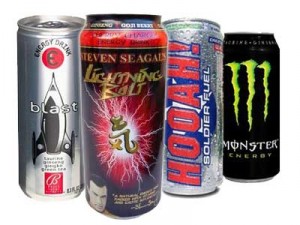 Walk by any group of teens hanging out together and you may very well see a wide assortment of energy beverages being consumed. It’s not unexpected, since more than half of all teens have reported using these stimulants. The next time you take your child to the doctor, be prepared to discuss these beverages, thanks to a new research study released online today in the Journal Pediatrics. The study, conducted by the University of Miami School of Medicine, shows how very harmful these drinks may be to this age bracket.
Walk by any group of teens hanging out together and you may very well see a wide assortment of energy beverages being consumed. It’s not unexpected, since more than half of all teens have reported using these stimulants. The next time you take your child to the doctor, be prepared to discuss these beverages, thanks to a new research study released online today in the Journal Pediatrics. The study, conducted by the University of Miami School of Medicine, shows how very harmful these drinks may be to this age bracket.
The study was conducted by running targeted searches of Google and the medical database PubMed. The research team pulled a total of 121 references to energy drinks, including RockStar, Monster, or Red Bull. Two-thirds of the references were discovered to be in scientific articles. Among the findings:
- Many children and young adults have tried energy drinks, and some consume them heavily. A survey of college students reported that 51% regularly consumed one or more of the drinks per month, and a majority of those students drank them several times a week, citing insufficient sleep and a desire for more energy as reasons for that consumption.
- The drinks are unregulated in the U.S., and the number of overdoses of caffeine from drinking them are not known. But in Germany, Ireland and New Zealand, officials have reported cases of liver damage, kidney failure, seizures, confusion and arrhythmias associated with energy drink use.
- Caffeine in the drinks can exacerbate cardiac conditions (especially in children with eating disorders) and interfere with calcium absorption and bone mineralization in young adolescents.
- Additional ingredients may boost caffeine levels.
- Extra calories in the drinks can contribute to diabetes, high BMI and dental problems.
Energy drinks often contain more caffeine than a cup of coffee and have additional stimulants such as ginseng and guarana added. They are popular with teens because they are advertised to improve energy, weight loss, stamina, athletic performance, and concentration. The study concluded by saying that energy drinks don’t appear to show any benefit to kids, and could put some children at risk for serious problems. Pediatricians are urged to discuss energy-drink consumption with their patients and to share with them the potential dangers. The team asked researchers to determine safe doses, warning that “unless research establishes energy-drink safety in children and adolescents, regulation…is prudent.”
Most healthy individuals can tolerate high levels of caffeine but those same high levels can cause seizures, mania, and even sudden death. The FDA does monitor soft drinks because they are categorized as food, but energy drinks fall under the classification of dietary supplements and as such are not monitored.
via latimes.com
Also Read:
Experts Want Label Overhaul for Energy Drinks
